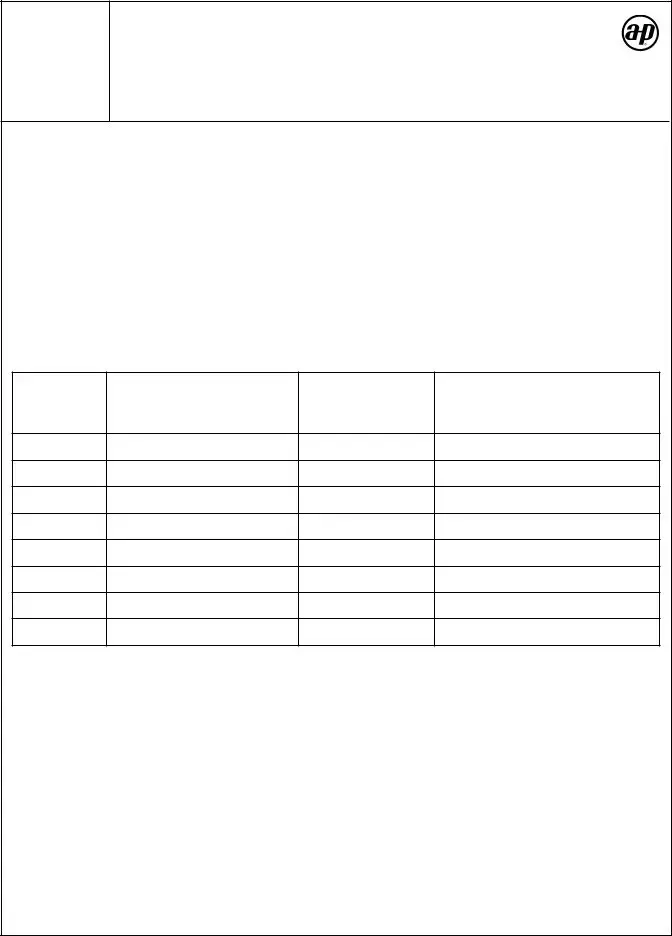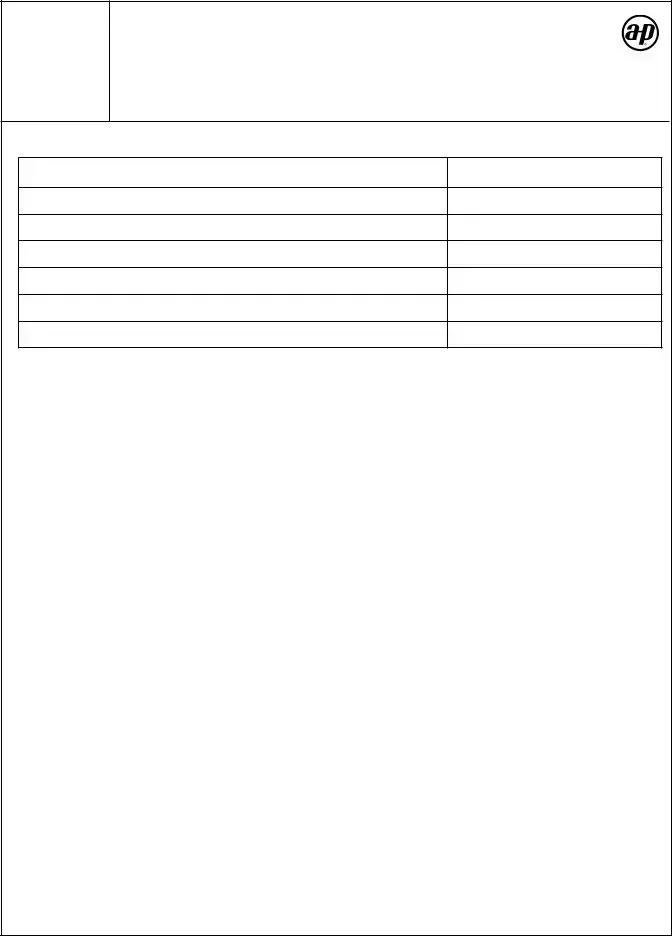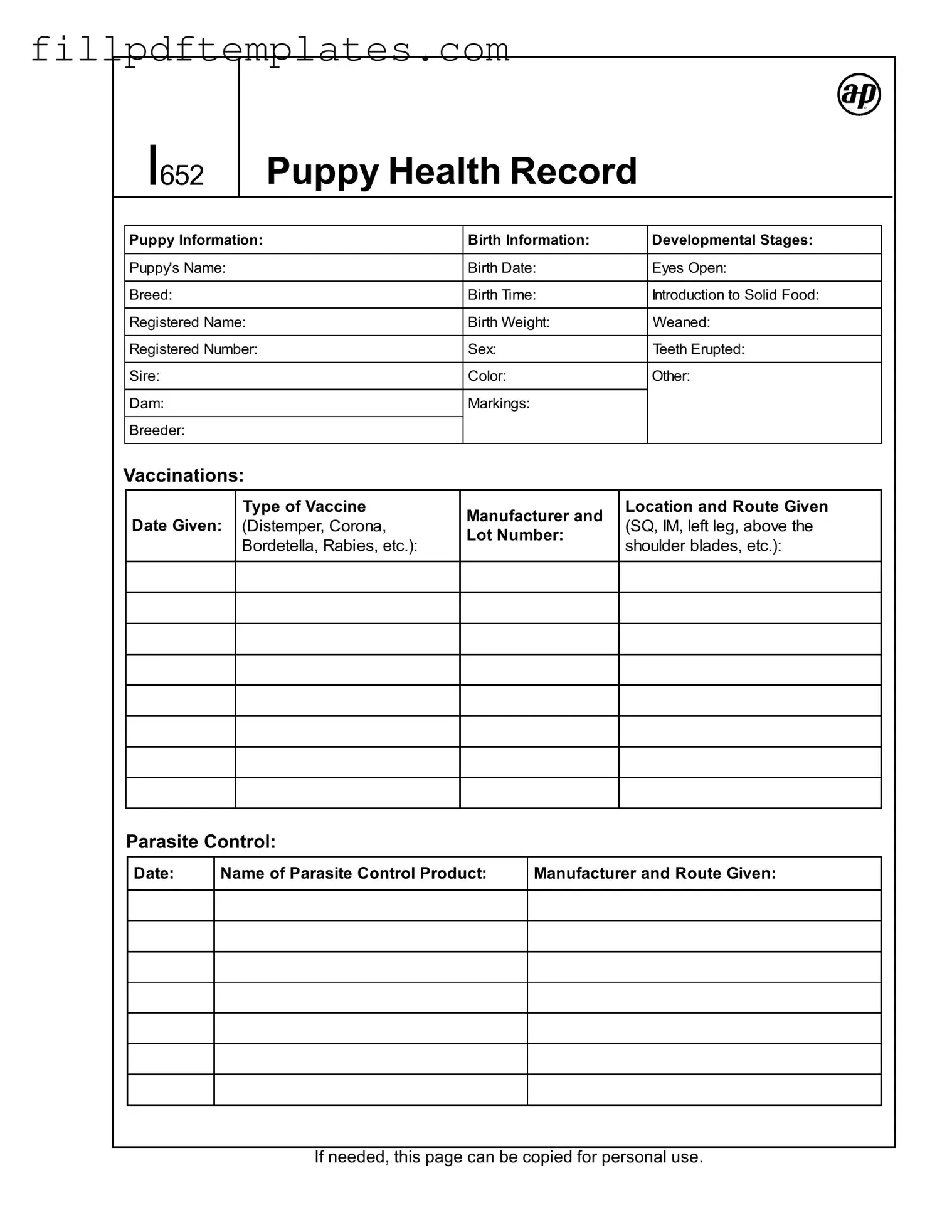Fill a Valid Puppy Health Record Template
The Puppy Health Record form serves as an essential tool for new puppy owners, providing a comprehensive overview of a puppy's health and developmental milestones. This document includes critical information such as the puppy's name, breed, birth date, and the details of its parents, including the sire and dam. It tracks various developmental stages, from the opening of the puppy's eyes to the introduction of solid food, ensuring that owners are aware of key growth markers. Vaccination records are meticulously documented, specifying the type of vaccine administered, the date given, and the manufacturer, which helps maintain a clear health history. Additionally, the form addresses parasite control, detailing the products used and their administration routes. Owners can also record examinations or procedures performed by a veterinarian, capturing findings and comments that contribute to the puppy's ongoing health management. The schedule of events from birth to spay or neuter serves as a guideline for important health interventions, including deworming and vaccinations, ensuring that owners remain proactive in their puppy's care. Overall, this form not only aids in tracking a puppy's health but also fosters responsible pet ownership.
Additional PDF Templates
How Many Cells in 96 Well Plate - Commonly used for assays, including enzyme-linked immunosorbent assays.
The importance of a Hold Harmless Agreement cannot be overstated, particularly in legal contexts where liability concerns arise. For individuals and businesses operating in Alabama, understanding the implications of a Hold Harmless Agreement is crucial, as it delineates responsibility and can safeguard against potential lawsuits stemming from accidents or injuries during events or activities. Being aware of how this agreement works ensures that parties can engage without the lingering worry of litigation.
Accord Forms - Accuracy in the form can lead to better premiums and coverage options.
What Information Must Be Listed on a Job Application? - Please reach out if you have questions while completing the form.
Similar forms
- Veterinary Health Record: Similar to the Puppy Health Record, this document tracks a pet's health history, including vaccinations, treatments, and examinations. It serves as a comprehensive overview of the animal's medical care.
- Pet Adoption Record: This form documents the details of an adopted pet, including background information, health status, and any vaccinations received. It ensures that new owners are informed about their pet's needs.
- Vaccination Record: This record specifically focuses on the vaccines administered to a pet. Like the Puppy Health Record, it includes dates, types of vaccines, and the administering veterinarian.
- Microchip Registration Form: This document contains information about a pet’s microchip, including the pet's name, owner details, and microchip number. It helps in reuniting lost pets with their owners.
- Breeder's Health Guarantee: This form outlines the health guarantees provided by a breeder. It is similar in that it includes health information and conditions for the pet's well-being.
- Pet Insurance Policy: This document details the coverage for veterinary care, including vaccinations and treatments. It is essential for pet owners to understand their financial responsibilities regarding their pet's health.
- Transfer-on-Death Deed: This legal document allows property owners to transfer their real estate to beneficiaries upon their death, avoiding probate, as outlined here: https://transferondeathdeedform.com/new-jersey-transfer-on-death-deed/.
- Emergency Care Plan: This plan outlines steps to take in case of a pet emergency. It includes health information similar to the Puppy Health Record, ensuring quick access to vital details when needed.
- Training and Behavior Record: This record tracks a pet's training progress and behavioral assessments. Like the Puppy Health Record, it helps owners monitor development and address any issues.
- Pet Travel Health Certificate: This document is required for traveling with pets, containing vaccination records and health assessments. It ensures that the pet is fit for travel and complies with regulations.
Document Specifics
| Fact Name | Description |
|---|---|
| Puppy Information | The form collects essential details about the puppy, including name, breed, and color. |
| Birth Information | It records the puppy's birth date, time, weight, and the names of the sire and dam. |
| Developmental Stages | The form outlines key milestones in the puppy's early life, such as when they open their eyes and start solid food. |
| Vaccination Tracking | Vaccination details are documented, including dates, types of vaccines, and the manufacturer. |
| Parasite Control | Information about parasite control products used on the puppy is included, along with their administration details. |
| Examinations | The form allows for notes on any examinations or procedures performed by the owner or veterinarian. |
| Schedule of Events | A timeline from birth to spay/neuter is provided, detailing important events and their recommended ages. |
| State-Specific Forms | Some states may require specific forms or additional information based on local laws regarding pet health records. |
| Owner's Responsibility | It emphasizes the owner's role in maintaining the health record and ensuring vaccinations are up to date. |
| Copy for Personal Use | The form can be copied for personal use, allowing owners to keep track of their puppy's health easily. |
Things You Should Know About This Form
-
What information is included in the Puppy Health Record form?
The Puppy Health Record form contains essential details about your puppy, including its name, birth date, breed, and weight at birth. Additionally, it tracks important milestones such as when the puppy's eyes opened, when solid food was introduced, and when the puppy was weaned. The form also includes vaccination records, parasite control details, and any examinations performed by a veterinarian or owner.
-
Why is it important to keep a Puppy Health Record?
Maintaining a Puppy Health Record is crucial for monitoring your puppy's health and development. It provides a comprehensive history of vaccinations, treatments, and milestones, which can be invaluable for future veterinary visits. This record helps ensure that your puppy receives timely vaccinations and preventative care, contributing to a long and healthy life.
-
How often should vaccinations be administered?
Vaccinations should ideally be given at three-week intervals, starting from six weeks of age. This schedule helps to build your puppy's immune system effectively. Consult with your veterinarian to determine the best vaccination plan tailored to your puppy's needs.
-
What should I do if I miss a vaccination appointment?
If you miss a scheduled vaccination, contact your veterinarian as soon as possible. They can advise you on how to catch up on missed vaccinations and ensure your puppy remains protected against diseases. It’s better to address missed vaccinations promptly rather than delay further.
-
What is the recommended schedule for deworming?
The Puppy Health Record form recommends deworming at various stages, starting at two weeks of age and continuing every few weeks until twelve weeks. The specific product may vary, but pyrantel pamoate is commonly suggested. Always consult your veterinarian for the best deworming schedule and product for your puppy.
-
Can I copy the Puppy Health Record form for personal use?
Yes, you can make copies of the Puppy Health Record form for your personal use. This allows you to keep track of your puppy’s health and development in multiple locations, ensuring you always have access to this important information.
Documents used along the form
The Puppy Health Record form is an essential document for tracking a puppy's health and development. Alongside this form, several other documents can provide valuable information and support for new puppy owners. Here are some commonly used forms that can enhance the care and understanding of a puppy's needs.
- Puppy Purchase Agreement: This document outlines the terms of the sale between the breeder and the new owner. It typically includes details about the puppy's health guarantees, registration, and any return policies.
- Vaccination Record: This form keeps a detailed log of all vaccinations received by the puppy. It includes dates, types of vaccines, and the veterinarian's information, ensuring that the puppy is up-to-date on necessary immunizations.
- Rental Application Form: To effectively screen potential tenants, landlords rely on the formal Rental Application process that gathers crucial information about applicants.
- Microchip Registration Form: If the puppy is microchipped, this document is crucial for registering the microchip with a national database. It helps ensure that the puppy can be returned if lost.
- Health Certificate: Issued by a veterinarian, this certificate verifies that the puppy has been examined and is free from contagious diseases. It is often required for travel or boarding.
- Feeding Schedule: This document outlines the recommended feeding times and amounts for the puppy. It helps owners maintain a consistent feeding routine to support healthy growth.
- Training Log: A training log allows owners to track the puppy's training progress, including commands learned, behavior issues, and milestones achieved during training sessions.
- Grooming Schedule: This form helps owners keep track of grooming needs, including baths, nail trims, and brushing schedules, to ensure the puppy remains clean and comfortable.
- Emergency Contact List: This document includes important contact information for veterinarians, pet sitters, and emergency animal hospitals. It ensures that help is readily available in case of an emergency.
These forms and documents work together to provide a comprehensive understanding of a puppy's health, training, and overall well-being. Keeping them organized and accessible can greatly enhance the experience of raising a happy and healthy puppy.
Puppy Health Record Preview

I652
PuppyHealthRecord
Puppy Information: |
Birth Information: |
DevelopmentalStages: |
|
|
|
Puppy's Name: |
BirthDate: |
Eyes Open: |
|
|
|
Breed: |
BirthTime: |
Introductionto Solid Food: |
|
|
|
Registered Name: |
BirthWeight: |
Weaned: |
|
|
|
Registered Num er: |
Sex: |
TeethErupted: |
|
|
|
Sire: |
Color: |
Other: |
|
|
|
Dam: |
Markings: |
|
|
|
|
Breeder: |
|
|
|
|
|
Vaccinations:
Date Given:
Type of Vaccine (Distemper,Corona, Bordetella,Ra ies,etc.):
Manufacturer and ot Number:
ocation and Route Given (SQ,IM,leftleg,a ove the shoulder lades,etc.):
ParasiteControl:
Date: |
Name of Parasite ControlProduct: |
Manufacturer and Route Given: |
|
|
|
|
|
|
|
|
|
|
|
|
|
|
|
|
|
|
|
|
|
|
|
|
Ifneeded,thispagecanbecopiedforpersonaluse.

I652
PuppyHealthRecord PAGE 2
ExaminationsorProceduresPerformedbyOwnerorVeterinarian:
Date: |
Findings and Comments: |
|
|
Owner or Veterinarian Initials:
Schedule of Events fromBirthtoSpayor Neuter
*Each vaccination should ideallybegivenatthree weekintervals.
**Thetimetobeginheart- worm medication can vary dependingontheproduct andtimeofyear.
***The
SeepagesA622andA905for parasitecontrolandvaccination suggestions.
Events |
Age |
Date |
|
|
|
Birthdate |
Day1 |
|
|
|
|
Dewclawremovaland taildock |
|
|
|
|
|
2 weeks |
|
|
|
|
|
Toenailtrim |
2 weeks |
|
|
|
|
Solid food introduction |
3 weeks |
|
|
|
|
4 weeks |
|
|
|
|
|
Toenailtrim |
5 weeks |
|
|
|
|
1stcar trip |
6 weeks |
|
|
|
|
1stshot |
|
|
|
|
|
Physicalexamination yvet |
|
|
|
|
|
6 weeks |
|
|
|
|
|
Weaning |
|
|
|
|
|
Move to cages |
7 weeks |
|
|
|
|
8 weeks |
|
|
|
|
|
Toenailtrim |
9 weeks |
|
|
|
|
2nd Shot* |
|
|
|
|
|
3rd Shot |
|
|
|
|
|
Beginheartwormmedication** |
|
|
|
|
|
12 weeks |
|
|
|
|
|
4thand finalshots |
|
|
|
|
|
Spayor neuter |
|
|
|
|
|
Ifneeded,thispagecanbecopiedforpersonaluse.
